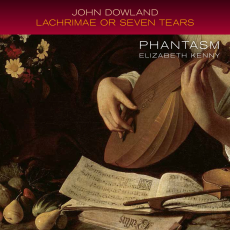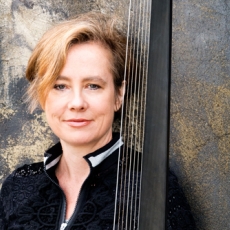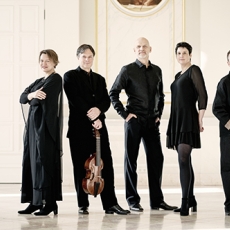Phantasm - Dowland: Lachrimae - Fanfare
For all that Elizabeth Kenny takes part in this recording, it's as an occasionally heard voice in the consort, and almost never as a featured one. (She does step forward briefly to shine in one of the divisions in The King of Denmark's Galliard.) That's an irony Dowland would surely have appreciated if not enjoyed, as he maintained the primacy of the lute over the newfangled viol da gamba-responding with anger to Tobias Hume's boast in the preface to one of his viol publications that "...from henceforth, the stateful instrument Gambo Violl shall with ease yielde full various and as devicefull Musicke as the Lute." Yet for all Dowland's scoffing, the viol soon eclipsed the lute as a favored instrument in English households. And though Lachrimae or Seven Tears went through many arrangements, it eventually became best known in its version for viol consort. Nor is it difficult to understand why, given the rich, darkly expressive warmth of the work's harmonies, and the viol consort's unparalleled ability to transmit this through sustained lines with perfect balance among all the parts.
The viol consort also proves an effective medium in the other 14 selections on this disc. Culled by Laurence Dreyfus from Dowland's extensive oeuvre, they concentrate for the most part on faster dance forms, galliards and allemandes. These pieces provide an effective contrast to the flowing lines and endless melancholy of Lachrimae, with their short themes, vigorous rhythms, and virtuosic divisions. Phantasm take this as their cue to underscore those rhythms, whether in polyrhythmic pieces such as Mr Nicolas Gryffth his Galliard, or more straightforward ones that include the popular Earl of Essex Galliard. Accenting is strong, encompassing an appropriately rustic enthusiasm at times, but with a clarity that never hides Dowland's considerable skill. Phantasm takes Lachrimae at a relatively fast clip. However, the work never feels restless under their hands. Phantasm's attention to phrasing, one of their signature features, perfectly limns the music's sorrowful vocalise.
I'd rank this version of Lachrimae above my previous favorite, the Dowland Consort with Jakob Lindberg. Their recording, for all its energy and detail, very occasionally lost its way in a musical Slough of Despond where the other CDs I've mentioned regularly reside. This album never does, and it's a joy to hear.

